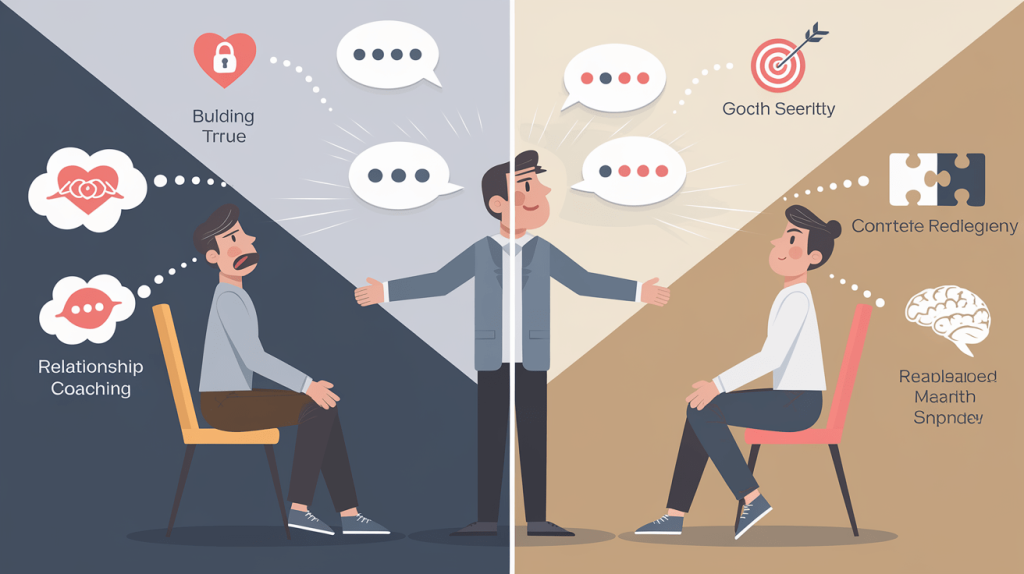Discover how relationship coaching can enhance communication, build trust, set effective goals, and lead to positive outcomes for healthier relationships.In today’s fast-paced and often overwhelming world, maintaining healthy and fulfilling relationships can be a challenge. With the rise of digital communication and shifting societal norms, many couples find themselves grappling with misunderstandings, conflict, and emotional disconnect. This is where relationship coaching comes in, offering invaluable support to help partners navigate their unique dynamics and strengthen their bonds. By focusing on enhanced communication skills, trust-building, and goal-setting, relationship coaching empowers individuals to cultivate deeper connections. In this article, we will explore the myriad benefits of relationship coaching, revealing how it can transform modern relationships into more harmonious and satisfying partnerships. Whether you’re facing difficulties or simply wish to elevate your relationship to new heights, understanding the positive outcomes of coaching can be a game-changer in your journey together.
Understanding The Need For Relationship Coaching Today
In today’s rapidly evolving society, the dynamics of modern relationships are often filled with complexities that can challenge even the strongest partnerships. As we navigate through various life changes, the need for relationship coaching becomes increasingly evident. Many couples find themselves facing issues that range from miscommunication to deeper emotional disconnections, leading to conflicts that may seem insurmountable.
Relationship coaching offers a structured approach to addressing these challenges. The rise of technology and social media has changed how we interact and form connections, often leading to misunderstandings and emotional distress. Through professional guidance, couples can develop essential communication skills that help in expressing their needs and feelings more effectively.
Moreover, the emphasis on *emotional intelligence* in coaching fosters an environment where partners learn to understand and empathize with each other’s perspectives. This understanding is crucial for conflict resolution and helps in bridging the gap that might exist between them.
In addition, relationship coaching serves as a preventative measure. Rather than waiting for issues to escalate, many couples are now seeking coaching to preemptively address potential areas of conflict and enhance their relational health. It equips partners with the tools they need to navigate challenges collaboratively, fostering resilience in their relationship.
As we embrace the complexities of modern relationships, investing in relationship coaching is a proactive step that can lead to positive outcomes, ensuring that couples not only survive but thrive together amidst life’s various pressures.
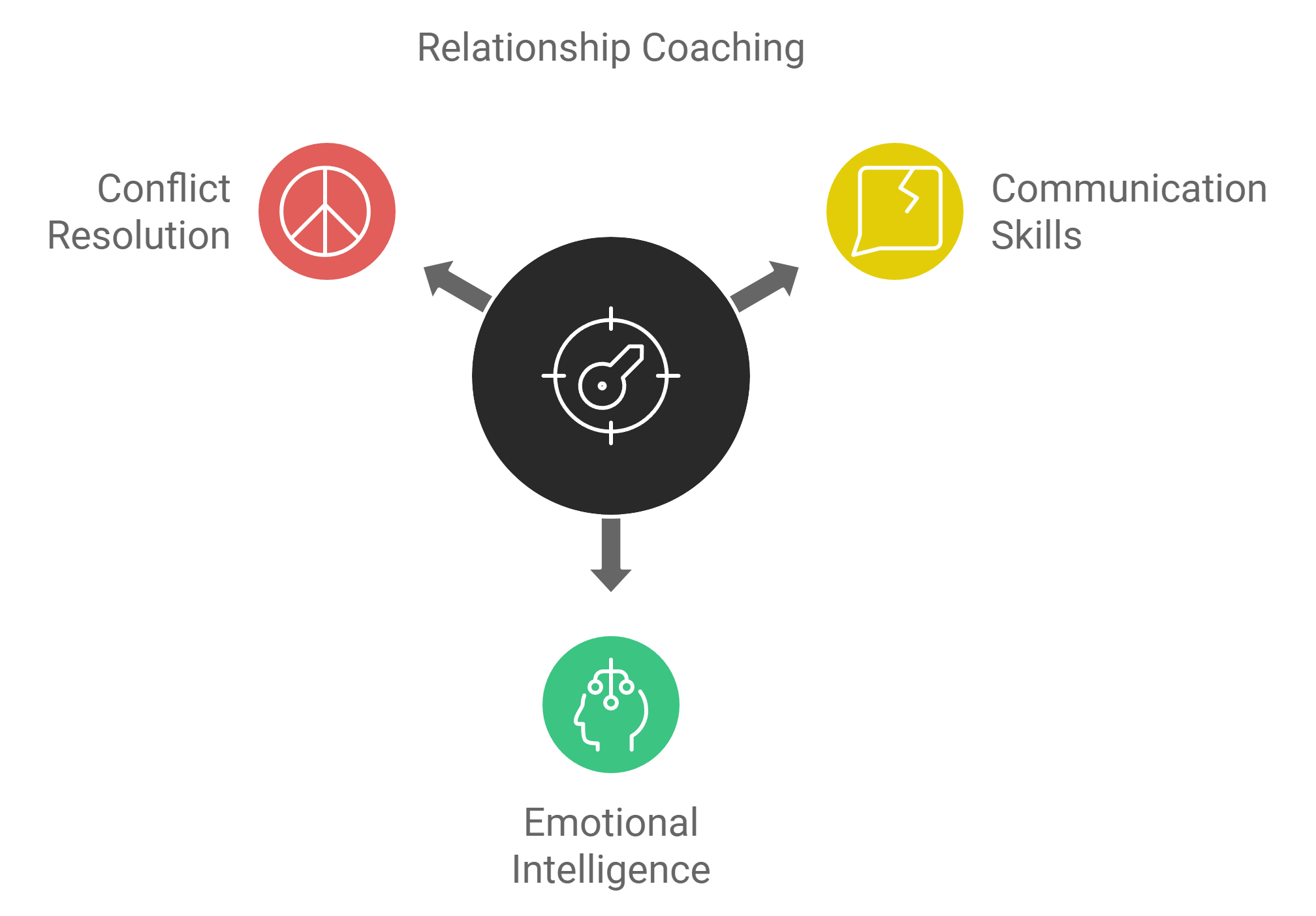
How Relationship Coaching Enhances Communication Skills
Effective communication is the cornerstone of any healthy relationship, and relationship coaching plays a pivotal role in enhancing these skills among couples. In today’s fast-paced world, characterized by modern relationships, misunderstandings can easily arise, often leading to conflicts. A skilled relationship coach can help partners develop crucial communication skills that foster understanding and empathy.
One primary focus of relationship coaching is to teach active listening. Active listening involves fully concentrating on the speaker, understanding their message, and responding thoughtfully. This skill not only helps in conflict resolution but also strengthens the emotional connection between partners. By dedicating time to listen without interruptions, couples learn to value each other’s perspectives, enriching their interactions.
Furthermore, relationship coaching emphasizes the importance of expressing feelings and needs clearly. Many individuals may struggle to articulate their emotions, which can result in frustration and disconnect. Coaches provide tools and techniques for partners to communicate their feelings effectively, ensuring that both parties feel heard and respected. This practice not only enhances emotional intelligence but also nurtures a supportive environment where both partners can grow.
| Key Communication Skills Developed | Description |
|---|---|
| Active Listening | Focusing completely on what the other person is saying, which reduces misunderstandings. |
| Effective Expression | Learning to articulate feelings and needs in a constructive way. |
| Non-Verbal Communication | Understanding body language and other non-verbal cues to improve understanding. |
| Conflict Resolution | Developing strategies to address disagreements while maintaining respect and connection. |
In summary, relationship coaching significantly enhances communication skills, which are fundamental for any healthy partnership. By focusing on active listening, effective expression, and conflict resolution, couples can cultivate a stronger, more positive connection, paving the way for long-lasting relationships.
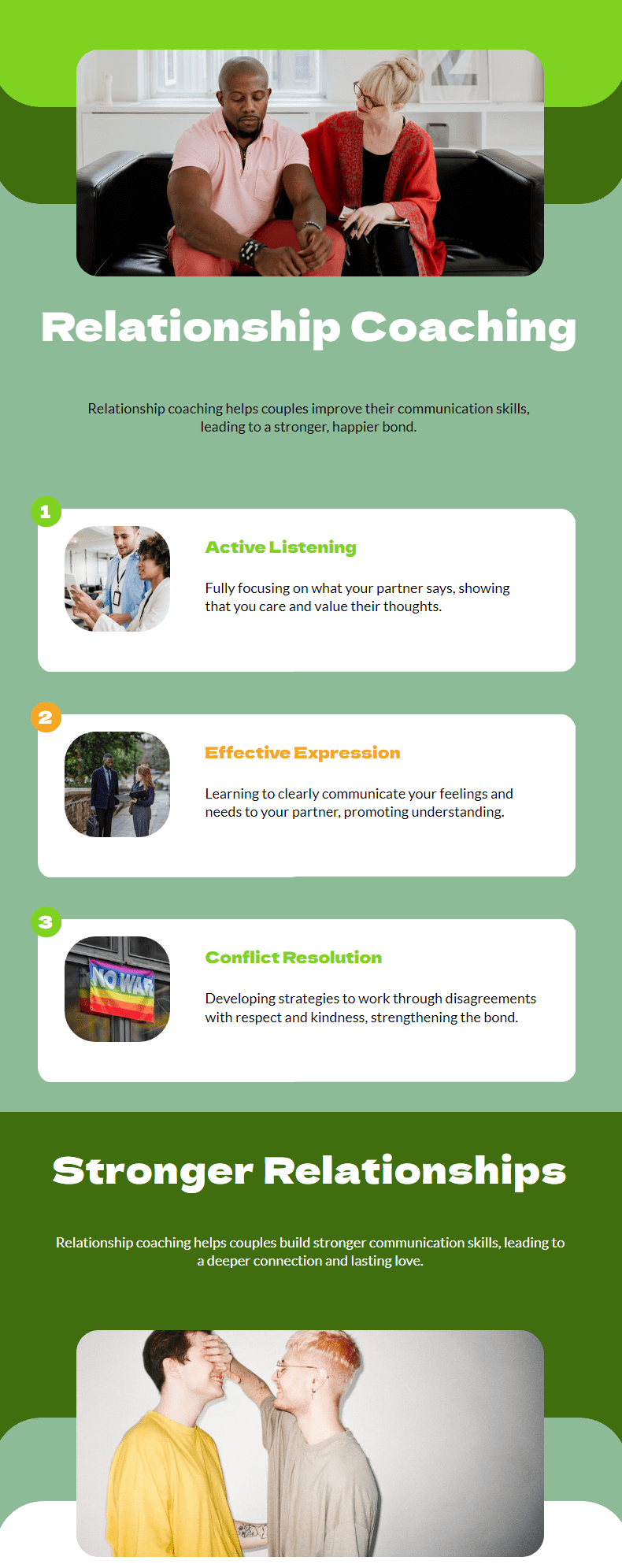
Building Trust Through Professional Relationship Coaching
In the realm of relationship coaching, one paramount goal is to foster and rebuild trust between partners. Trust acts as the cornerstone of any healthy relationship, and when it is compromised, partners often struggle to connect meaningfully. Through targeted coaching sessions, couples can explore the underlying issues that may have led to a breakdown in trust and work together to restore it.
Professional relationship coaching provides a safe space for individuals to express their feelings and vulnerabilities without fear of judgment. This environment is crucial for nurturing emotional intelligence, which plays a significant role in understanding one another’s perspectives. As couples learn to communicate more openly, they can begin to navigate the difficulties that challenge their trust.
Furthermore, the tools and techniques provided by a skilled coach can aid partners in developing superior communication skills. These skills are essential for effectively articulating needs and resolving conflicts, which, in turn, strengthens the bonds of trust. Regular coaching sessions can also facilitate conflict resolution strategies that empower couples to confront issues head-on rather than avoiding them, leading to a deeper trust built on honesty and transparency.
In addition to improving communication, relationship coaching encourages partners to set mutual goals and expectations. By clearly defining what trust looks like for both individuals, couples can eliminate ambiguity and work collaboratively towards creating a more secure partnership. This proactive approach not only helps to mend broken trust but also establishes a framework for maintaining it in the future.
Ultimately, investing in relationship coaching opens pathways for growth, understanding, and healing, enabling couples to build a more resilient foundation of trust and intimacy in their modern relationships.
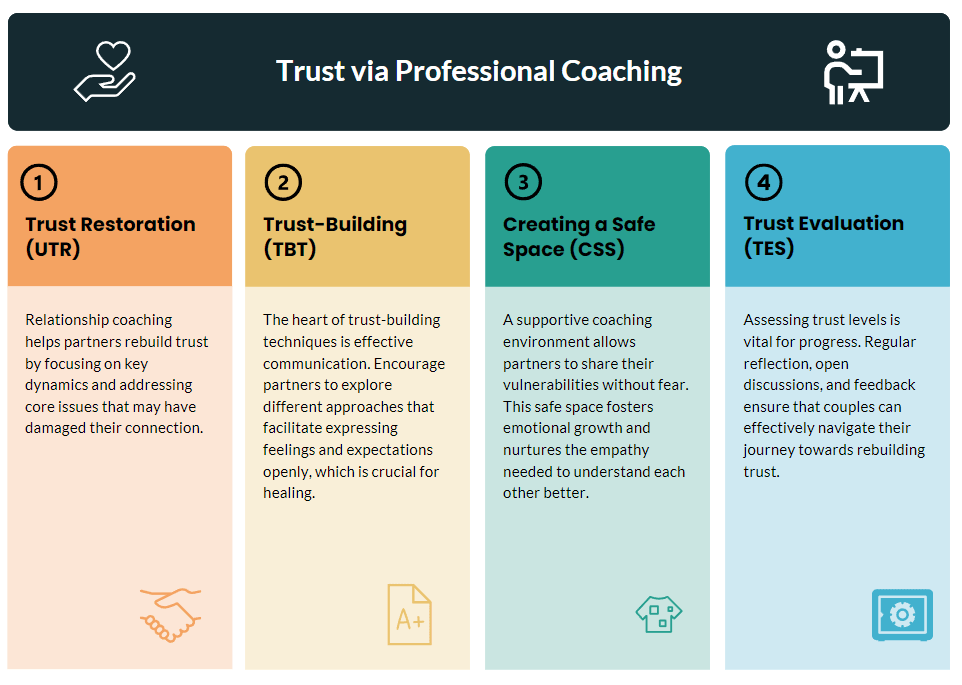
Setting Goals For A Successful Relationship Coaching Experience
Setting clear and achievable goals is a foundational aspect of a successful relationship coaching experience. By outlining specific objectives, couples can navigate their journey more effectively and track their progress. Here are some essential components to consider when establishing your goals in relationship coaching:
| Goal Type | Description |
|---|---|
| Communication Skills | Enhancing dialogue between partners to express feelings and needs more openly. |
| Conflict Resolution | Developing strategies for managing disagreements constructively to strengthen the relationship. |
| Emotional Intelligence | Improving self-awareness and empathy to foster a deeper connection. |
| Trust Building | Creating a framework to rebuild and maintain trust through honest interactions. |
| Relationship Growth | Identifying areas for personal and mutual growth as partners evolve over time. |
To make your goals SMART (Specific, Measurable, Achievable, Relevant, Time-bound), you can follow these guidelines:
1. Specific: Define exactly what you want to achieve. For instance, instead of “improve communication,” a specific goal could be, “schedule weekly check-ins to discuss our feelings.”
2. Measurable: Establish criteria to evaluate your success. For example, “resolve conflicts without raising our voices at least 80% of the time within three months.”
3. Achievable: Ensure that your goals are realistic given your circumstances. It’s important to aim for progress rather than perfection.
4. Relevant: Align your goals with your relationship’s needs and aspirations. Work on issues that genuinely matter to both partners.
5. Time-bound: Set a timeline for achieving your goals to create a sense of urgency and accountability.
By actively participating in the process of establishing these goals within relationship coaching, you and your partner can cultivate a more fulfilling partnership, enhance your communication skills, and foster long-term satisfaction in your modern relationships. Engaging in this goal-setting process not only helps clarify your intentions but also reinforces commitment to the growth and sustainability of your relationship.
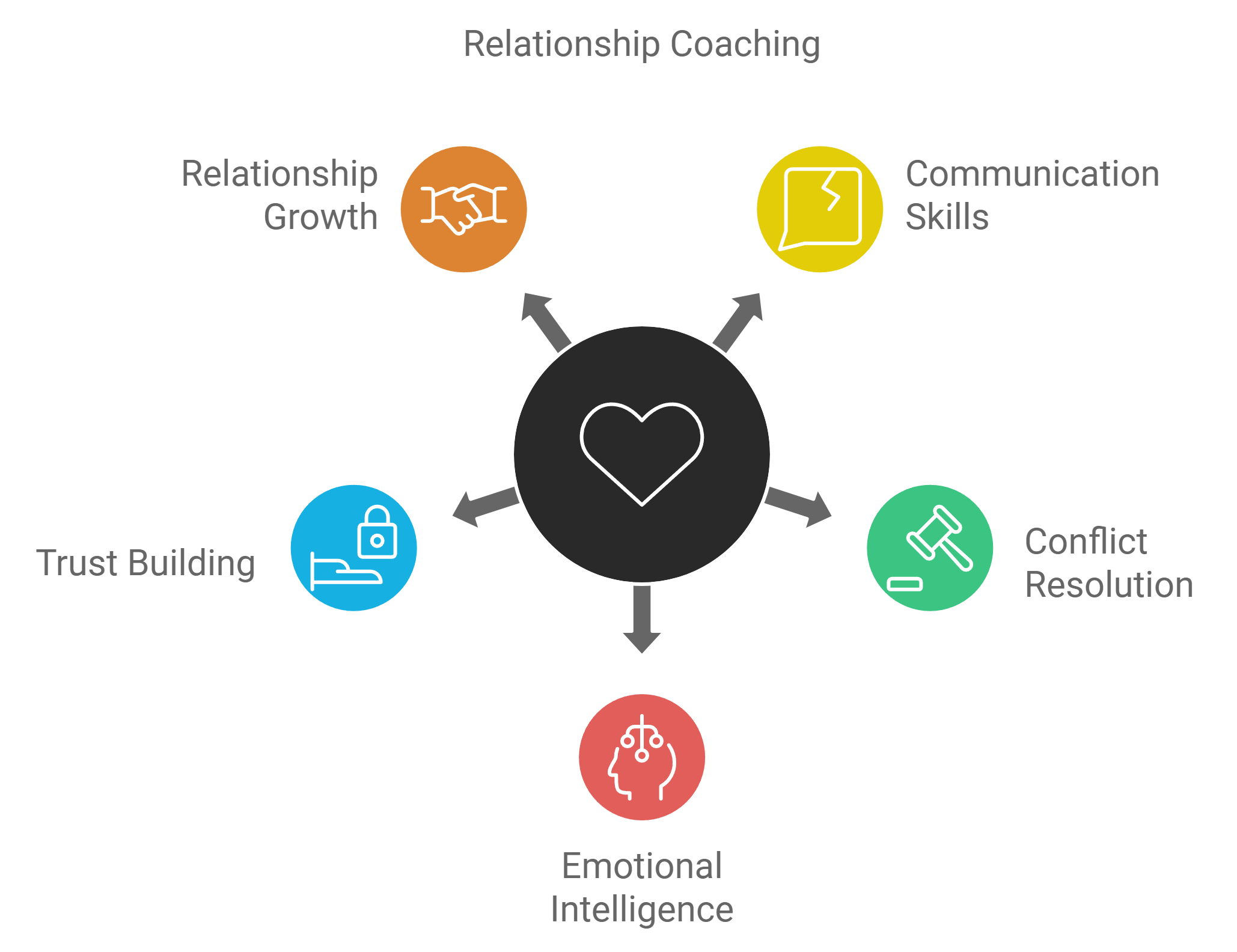
The Positive Outcomes Of Relationship Coaching Sessions
Relationship coaching offers numerous benefits that significantly enhance the dynamics between partners. One of the key positive outcomes is the improvement of communication skills. During coaching sessions, individuals learn how to express their feelings and needs effectively, which is crucial in modern relationships. Effective communication leads to a deeper understanding and minimizes misunderstandings.
Another evident outcome is the development of emotional intelligence. Individuals become more aware of their emotions and learn how to manage them in a healthy way. This increased emotional awareness can lead to better conflict resolution strategies, allowing couples to handle disagreements constructively rather than destructively.
Coaching sessions also provide a safe space for partners to explore their goals and aspirations. Through careful guidance, couples can identify areas in their relationship that require attention and set actionable goals for improvement. This structured approach fosters engagement and commitment, making relationships stronger.
| Positive Outcomes | Description |
|---|---|
| Enhanced Communication | Improved expression of feelings and needs, fostering a deeper understanding. |
| Increased Emotional Intelligence | Better management of emotions leading to healthier interactions. |
| Effective Conflict Resolution | Strategies for handling disagreements constructively. |
| Goal Setting | Identifying and addressing areas for improvement in the relationship. |
Ultimately, the goal of relationship coaching is to create a loving and supportive partnership. Couples who engage in this process often report greater satisfaction and fulfillment in their relationship, leading to a more balanced and harmonious life together. By investing in relationship coaching, individuals not only enhance their relationship but also contribute to their personal growth and happiness.
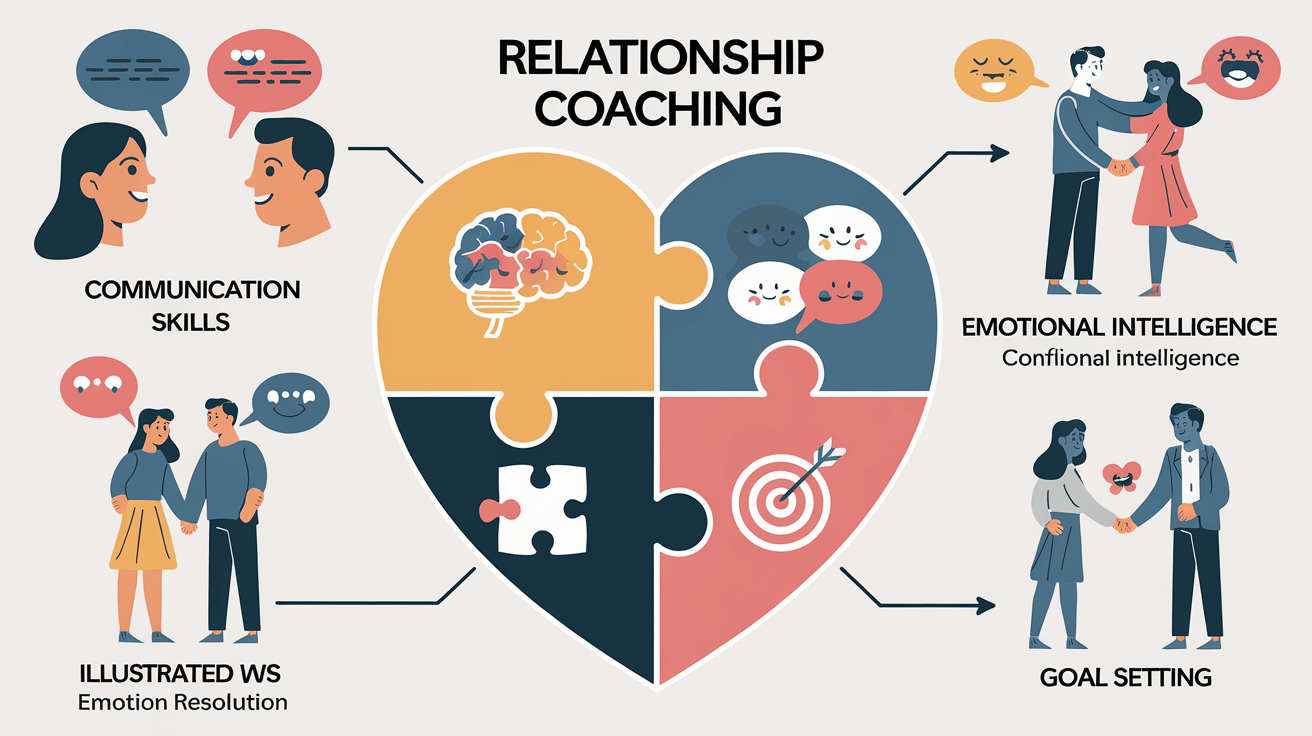
Why Investing In Relationship Coaching Is Worth It
Investing in relationship coaching offers numerous benefits that can significantly enhance the quality of your relationships. In today’s fast-paced world, characterized by diverse challenges and increasing stress, the need for effective support structures becomes essential. Here are some compelling reasons why relationship coaching is a smart investment.
Firstly, relationship coaching helps individuals and couples develop essential communication skills. Clear and honest communication is the foundation of any successful relationship. Coaches are trained to guide clients in articulating their feelings and needs in ways that foster understanding and connection, ultimately leading to stronger, healthier bonds.
Moreover, relationship coaching emphasizes the importance of emotional intelligence. By learning to understand and manage their emotions, clients can approach conflicts with greater empathy and perspective. This skill is pivotal for resolving disagreements constructively, allowing relationships to thrive rather than suffer under the weight of unresolved issues.
Conflict resolution is another critical area where relationship coaching shines. Coaches equip couples with the tools needed to navigate conflicts without resorting to destructive patterns. This proactive approach not only mitigates immediate tensions but also builds resilience in the relationship for future challenges.
Furthermore, investing in relationship coaching can be seen as a form of preventative maintenance for relationships. Just as one would seek professional help for physical health or career guidance, relationship coaching serves as a proactive strategy to ensure that relationships are thriving instead of merely surviving.
Lastly, the insights gained from couples therapy or relationship coaching extend beyond the immediate relationship context. Clients often find that the skills developed can enhance other areas of their lives, including friendships, family dynamics, and workplace relationships, making the investment profoundly rewarding on multiple levels.
In conclusion, whether facing challenges or seeking to deepen connection, investing in relationship coaching can lead to transformative personal and relational growth, proving to be a worthwhile endeavor for anyone seeking fulfillment in their modern relationships.
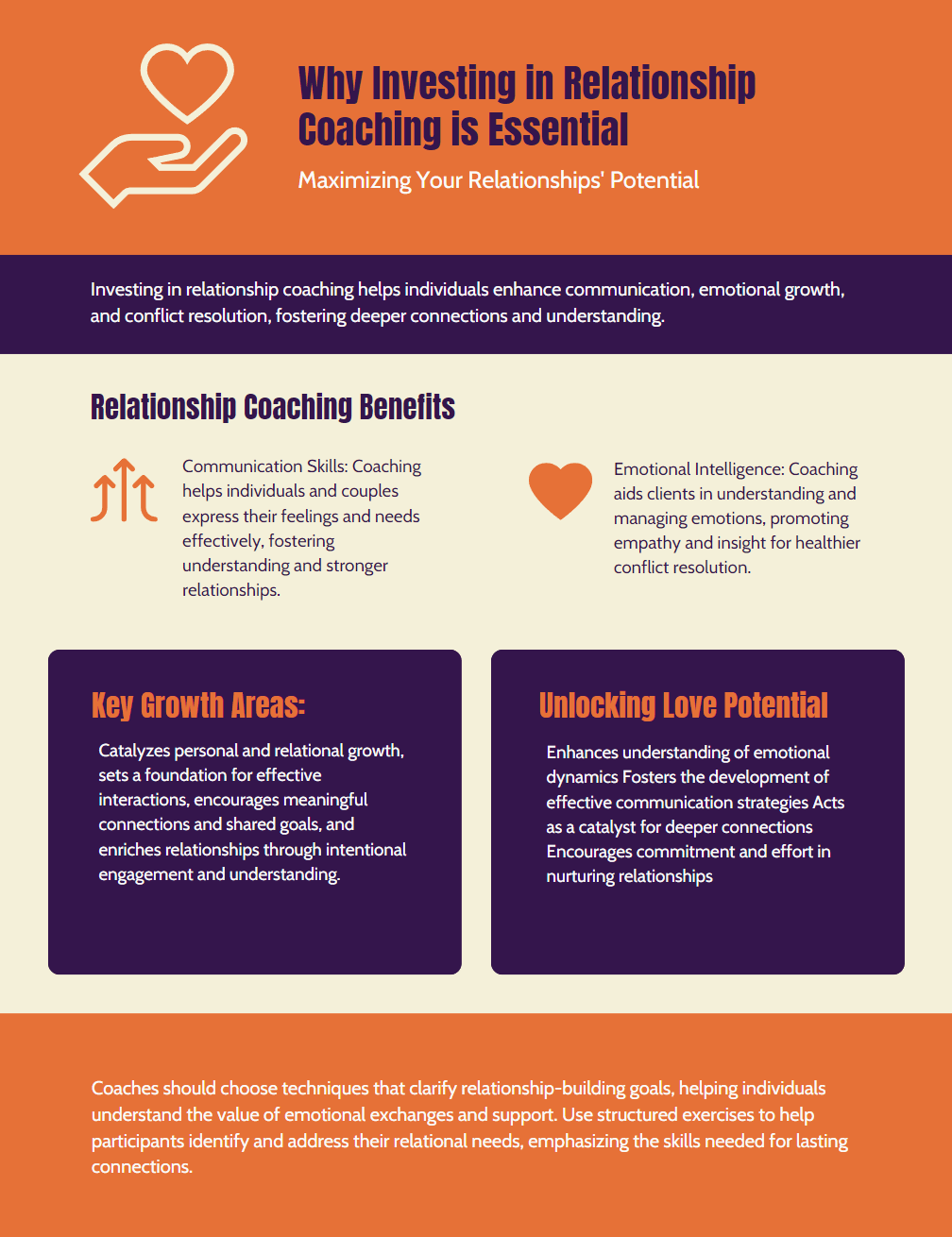
Frequently Asked Questions
What is relationship coaching?
Relationship coaching is a process where a trained professional helps individuals or couples improve their relationships through guidance, support, and practical strategies.
How can relationship coaching benefit couples?
Couples can benefit from relationship coaching by gaining enhanced communication skills, resolving conflicts more effectively, and understanding each other’s needs and perspectives.
Who can benefit from relationship coaching?
Anyone can benefit from relationship coaching, including singles looking to improve their dating life, couples facing challenges, or even those seeking to build healthier relationships.
What are some common issues addressed in relationship coaching?
Common issues addressed include communication breakdowns, trust issues, conflict resolution, intimacy challenges, and navigating life transitions together.
How does relationship coaching differ from therapy?
While both focus on improving relationships, coaching is typically more goal-oriented and future-focused, whereas therapy often involves exploring past experiences and emotional issues.
What are the key takeaways from relationship coaching?
Key takeaways may include improved communication techniques, conflict management strategies, and tools for fostering emotional intimacy and connection.
How can someone find a qualified relationship coach?
Individuals can find a qualified relationship coach by checking professional directories, seeking recommendations, or looking for certifications from recognized coaching organizations.
Nelson-Jones, Richard. Human relationship skills: coaching and self-coaching. Routledge, 2006.

